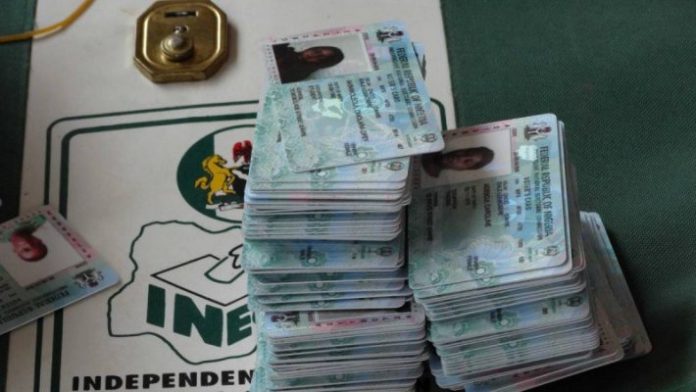TWENTY FOUR years after the start of the Fourth Republic, democracy is less and less participatory, excluding more and more citizens. This harsh reality is extremely disturbing. The receding inclusivity is evidenced in the latest progress report on the 2023 general election that almost seven million registered people had not picked up their permanent voter cards as of the first week of 2023. Throughout these years, the Nigerian politicians have ruined the country through their incompetence and self-centeredness, so Nigerians must collectively reverse this and make democracy flourish through their mass participation.
Approximately 6.7 million PVCs were not collected in 17 states and the Federal Capital Territory as of January 4, according to a report in The PUNCH. With less than 45 days to go before the Presidential/National Assembly elections on February 25, this is a huge figure. As of December 29, approximately 1,693,963 PVCs remained uncollected in Lagos State. PVC collection is suffering a similar fate in other states.
In political language, this is disenfranchisement. The Independent National Electoral Commission opened the collection window on December 12; It will close on January 22. As INEC has repeatedly said, any registrant who does not have a PVC will not be able to vote in the 2023 elections, as only the bimodal voter accreditation system will be used.
By 2023, the arbitrator registry contains 93.4 million names, up from 82.3 million in 2019. Many did not collect their PVCs at that time. The result was that only 28.6 million, or 35 percent, voted in the 2019 presidential election. That percentage meant that the winner was not truly representative of the whole.
Aside from the 1996 Zimbabwean presidential election, which recorded voter turnout of 32.3 percent, this is the second lowest in recent elections in Africa. This trend tainted the recent NASS off-season and gubernatorial elections. Among others, the East Lagos Senate elections garnered a 10 percent turnout in 2020.
Democracy without popular participation was also at stake in the gubernatorial vote in Edo State in 2020, registering a turnout of 24.22 percent; the polls for the government of Ondo (2020) had an electoral participation of 31.6%; Anambra in November 2021 registered 10.38 percent; Ekiti State in June 2022 had 36.5 percent; and the state of Osun in July 2022 registered 42.16%. Clearly Nigerians are not voting.
By comparison, the six African countries with the highest voter turnout according to their most recent polls are Rwanda: 98.2%, Equatorial Guinea: 92.7%, Angola: 90.4%, Seychelles: 90.1%, Guinea Bissau: 89 .3% and Zimbabwe: 86.8 percent. At 53.8 percent, voter turnout has been on the rise since the 2012 US presidential election. It was 54.8 percent in 2016 and 66.8 percent in 2020, the US Census Bureau says. In the UK, 67.3 percent voted in the 2019 general election.
In Nigeria, participation is declining mainly because democracy does not seem to be working for the majority. Two, it’s cumbersome to register and collect PVC. And three, pre- and post-election violence deters voters.
In this, the few public office holders and their supporters enjoy obscene opulence and impunity. Many cite inconveniences associated with registering to vote or picking up their PVCs. The majority live in poverty, as evidenced by the 133 million people living in poverty.
Violence claimed 626 lives in the six months leading up to the 2019 general election, the Nigerian Civil Society Situation Room said. The massive queues to register; slow data capture; attacks by armed men on registration/collection points; and the time that elapses between registration and collection are causal factors that cannot be desired to disappear. Between the registration and the collection of the printed PVCs, the time interval is enormous.
Really, Nigerian politicians are charlatans; they only pursue their own narrow interests. At this time in national life, Nigerians should not be discouraged and leave democracy to politicians because without PVC they cannot vote.
INEC, the National Guidance Agency, civil society and other stakeholders must devise a methodology to incentivize Nigerians to collect their PVCs before the deadline. Elsewhere, political parties are at the forefront of mobilizing voters. In Nigeria, political parties buy PVC to deprive voters of areas where the opposition seems strongest.
The standard excuse is that in Nigeria votes don’t count. According to INEC, the votes will count in 2023. Nigerians should give the commission the benefit of the doubt. Backed by the 2022 Electoral Law, he has declared that BVAS and the electronic transmission of results from the voting unit to the INEC results viewing portal are the cure for the manipulation that made past election results dubious and open. to a long dispute. Independent monitors recognized the credibility of BVAS in last July’s off-season gubernatorial election in Osun state.
The INEC must intensify this and other technologies before the first electoral day in February, and the citizens must go en masse to collect their PVCs and vote. Young people, who are active on social media, blaming the country’s problems on the leaders, must realize that they can only express their anger by voting. Social networks are nothing more than a channel to express frustration, but votes count at the polls.
Nigerians should be aware that there is no such thing as a wasted vote in a democracy. Even a single vote for any of the 18 presidential candidates makes a moving statement about the election. It reinforces the principle of democracy that the winner must consider the interests of the minority.
Elections are held elsewhere with minimal disruption. Therefore, the police must take charge of security in and around polling stations before, during and after voting. There is no point in deploying thousands of security agents for election duties and violence will continue to occur to alienate voters on Election Day.
The president, Major General Muhammadu Buhari (ret.), must fulfill his promise to bequeath fair and credible elections to Nigerians by supporting the electoral process with a strong security system.







